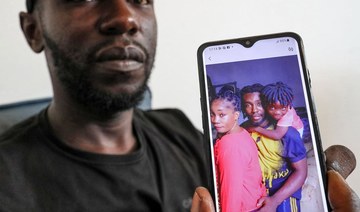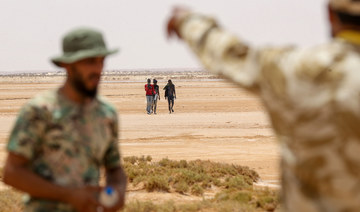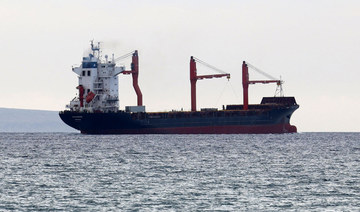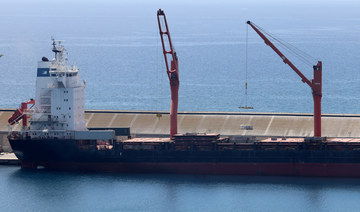TRIPOLI: Libya’s High State Council (HSC) consultative body replaced its leader in a televised vote on Sunday, adding new uncertainty to a political standoff over control of government and the path to elections.
The Tripoli-based HSC has a say in major political matters under the terms of a 2015 political agreement and has been negotiating with Libya’s main parliament, the House of Representatives, which is based in the country’s east.
HSC members chose Mohammed Takala in a run-off by 67 votes to 62, ousting Khaled Al-Meshri who had led the Tripoli-based body since 2018. Meshri congratulated Takala on his win.
The HSC and the HoR have been negotiating a path to elections under UN pressure, but they have both sought to replace the interim government in Tripoli before any national vote.
Prime Minister Abdulhamid Al-Dbeibah, seen as a political rival of both Meshri and the HoR speaker Aguila Saleh, has said he will not cede office until after an election and last year he fought off brief armed efforts to unseat him.
It was not immediately clear how the election of Takala would impact the HSC’s talks with the HoR over electoral rules, or the two bodies’ push to replace Dbeibah.
International diplomacy has long focused on presidential and parliamentary elections as a critical element of any lasting solution to Libya’s conflict, with both the HoR and the HSC now facing big questions over their legitimacy.
The HoR was elected to a four-year term in 2014, but the previous parliament, which had been elected in 2012, and the supreme court rejected the legitimacy of the vote as eastern and western factions split in a new round of civil war.
Libya has had little peace or stability since a 2011 NATO-backed uprising, but major fighting has paused since a cease-fire in 2020 when a UN-backed process pushed for new elections under Dbeibah’s interim Government of National Unity.
Both the HSC and HoR initially endorsed Dbeibah, but they could not agree rules for an election and the planned vote was canceled shortly before it was due to be held in late 2021. They have since rejected Dbeibah’s mandate, pushing for a new interim government.
UN diplomatic efforts have continued to push the bodies to agree rules for an election, but many Libyans believe the HoR and HSC have little interest in holding a vote that would push them both from office.
Libya’s High State Council votes to replace leader
https://arab.news/9ksqa
Libya’s High State Council votes to replace leader

Officials discuss plans for 54th session of the Council of Arab Information Ministers

- Arab League’s assistant secretary-general and Bahrain’s minister of information review agenda for the 3-day ministerial meeting, which begins on Monday
- A key item is the implementation of an Arab Media Strategy to Combat Terrorism
CAIRO: The Arab League’s assistant secretary-general and head of its media and communication sector, Ambassador Ahmed Rashid Khattabi, and Bahrain’s minister of information, Ramzan Al-Nuaimi, discussed the agenda and arrangements for the 54th session of the Council of Arab Information Ministers, which will take place on May 27 to 29.
Their meeting followed the Arab Summit in Manama last week, which issued resolutions relating to various strategic, political and developmental issues affecting the Arab region. It also explored ways to enhance mechanisms for Arab cooperation, including media support for the Palestinian cause in light of the latest developments and the repercussions of Israel’s war on the Gaza Strip.
Khattabi and Al-Nuaimi reviewed the draft agenda for the upcoming ministerial meeting, which was approved by the Executive Office of the Council of Arab Information Ministers during its meeting on Dec. 24 in Libya.
It includes several items related to proposed projects for the development and enrichment of a comprehensive and diverse Arab media system. A key item is the implementation of an Arab Media Strategy to Combat Terrorism, which was approved during the Arab Summit.
Other significant topics include a media map for achieving sustainable development by 2030; environmental media; educational media; ways to enhance the status of women in the media; and the development of capacity through the use of artificial intelligence technology.
The agenda also includes a proposal by the General Secretariat for the development of a charter detailing the responsibilities of the media in coverage of elections. It includes issues such as the role of the media in electoral campaigns; respect for the rules of pluralism, transparency and neutrality; and the prevention of discrimination based on gender, race or language.
During their meeting next week, the information ministers will also discuss organizational matters, and the winners of the eighth Arab Media Excellence Awards will be announced on the sidelines of the event. More than 100 entries were submitted and the winners chosen by a special committee of judges from member states, chaired by Kuwait, the sponsor of the awards.
At least 85 dead from fighting in Sudan’s El-Fasher: charity

- On Monday alone, nine of 60 casualties received at Southern Hospital — El-Fasher’s only remaining medical facility — had died of their wounds
- El-Fasher is the only state capital in the vast western region of Darfur not under RSF control
PORT SUDAN: At least 85 people have died in a single hospital in the Darfur city of El-Fasher since fighting reignited between Sudan’s warring parties on May 10, medical charity Doctors Without Borders said Tuesday.
On Monday alone, nine of 60 casualties received at Southern Hospital — El-Fasher’s only remaining medical facility — had died of their wounds, said Claire Nicolet, head of the charity’s Sudan emergency program.
In the period since the fighting erupted in the North Darfur state capital, the hospital had received “707 casualties” and “85 have passed away,” she added.
For over a year, fighting has raged between the regular military, under army chief Abdel Fattah Al-Burhan, and the paramilitary Rapid Support Forces, led by his former deputy Mohamed Hamdan Dagalo.
El-Fasher is the only state capital in the vast western region of Darfur not under RSF control and is a key humanitarian hub for a region on the brink of famine.
This month, it has been the site of fierce battles, despite repeated pleas including from the United Nations for fighters to spare the city.
Eyewitnesses have reported repeated artillery shelling and gunfire from both sides, as well as air strikes from the army.
Trapped in their homes by the fighting, many residents are unable to brave the violence on the streets to get wounded loved ones to the hospital.
Doctors Without Borders said casualties who reach Southern Hospital are met by “only one surgeon, putting the facility “under intense pressure.”
Across the country, the war has shuttered over 70 percent of medical facilities and stretched the remaining ones impossibly thin.
“We have only around 10 days of supplies left” for Southern Hospital, Nicolet said, urging the warring parties to provide “safe access” to enable them to replenish stocks.
Since the war began, tens of thousands of people have been killed, including up to 15,000 in a single West Darfur town, according to UN experts.
Nearly nine million people have been forced from their homes. By the end of April, North Darfur alone hosted more than half a million people newly displaced in the last year, according to the latest figures from the UN.
Houthis claim 5th US drone shoot-down since November

- The Houthi military launched “a locally made surface-to-air missile” at the US MQ-9 Reaper drone
- The Houthi claim on Tuesday was the second in less than a week concerning an MQ-9 Reaper shoot-down, and the fifth since November
AL-MUKALLA: Yemen’s Houthis claimed on Tuesday to have shot down another US drone over the central province of Al-Bayda, marking the fifth such claim by the militia since the start of their Red Sea campaign in November.
Spokesman Yahya Sarea said in a televised broadcast that the Houthi military launched “a locally made surface-to-air missile” at the US MQ-9 Reaper drone, which crashed in Al-Bayda province.
Sarea did not disclose when the shoot-down took place, but said the military action came in support of the Palestinian people and as retribution for US and UK bombings of Houthi-controlled parts of Yemen.
“The Yemeni Armed Forces continue to enhance their defensive capacities in order to face the American-British aggression against our nation and carry out military operations in triumph for the oppressed Palestinian people,” Sarea said.
The Houthi claim on Tuesday was the second in less than a week concerning an MQ-9 Reaper shoot-down, and the fifth since November.
On Friday, the militia said its forces shot down a US drone over the central province of Marib while conducting “hostile operations,” soon after locals reported hearing a loud blast and finding wreckage of a drone resembling an MQ-9 Reaper.
The Houthis had previously claimed to have shot down the same drone model on April 26 and Feb. 19 this year, as well as on Nov. 8 last year, over Saada, Hodeidah and the Red Sea, respectively.
Since November, the Houthis have attacked ships in international waters around Yemen, mainly the Red Sea, using drones, ballistic missiles and drone boats.
The militia claims its campaign is solely targeting Israel-linked ships in solidarity with Palestinians in Gaza.
The US has responded to the Houthi attacks by identifying the militia as a terrorist organization, organizing a coalition of marine task forces and carrying out strikes on Houthi sites in Yemen.
In an attempt to revive peace talks stalled by the Houthi Red Sea campaign, the US State Department said on Monday that Yemen envoy Tim Lenderking will return to Saudi Arabia, the UAE and Oman.
He will meet officials in those countries to discuss the Houthi Red Sea campaign and its implications on Yemen’s peace process.
“The Houthis’ continued attacks threaten progress toward achieving a durable resolution to the conflict in Yemen and obstruct the delivery of humanitarian assistance to Yemenis and people in need across the region,” the US State Department said.
UNRWA says food distribution in Rafah suspended due to insecurity

- UNRWA said in a statement on X that only seven out of its 24 health centers were operational and that it had not received any medical supplies in the past 10 days
DUBAI: The UN agency for Palestinian refugees (UNRWA) said on Tuesday that food distribution in Gaza’s southern city of Rafah were currently suspended due to lack of supplies and insecurity.
UNRWA said in a statement on X that only seven out of its 24 health centers were operational and that it had not received any medical supplies in the past 10 days due to “closures/disruptions” at the Rafah and Kerem Shalom crossings into Gaza.
Israel mounted a new push in central Gaza on Monday, bombarding towns in the north of the Palestinian enclave and saying it intended to broaden operations in Rafah despite US warnings of the risk of mass casualties in the southern city.
Simultaneous Israeli assaults on the southern and northern edges of Hamas-ruled Gaza this month have caused a new exodus of hundreds of thousands of people from their homes, and sharply restricted the flow of aid, raising the risk of famine.
Cyprus says maritime aid shipments to Gaza ‘on track’

- 1,000 tons of aid were shipped from Cyprus to the besieged Palestinian territory between Friday and Sunday
- The vessels were shuttling between Gaza and the east Mediterranean island
NICOSIA: Four ships from the United States and France are transporting aid from Larnaca port to the Gaza Strip amid the spiralling humanitarian crisis there, the Cyprus presidency said on Tuesday.
Victor Papadopoulos from the presidential press office told state radio 1,000 tons of aid were shipped from Cyprus to the besieged Palestinian territory between Friday and Sunday.
He said the vessels were shuttling between Gaza and the east Mediterranean island, a distance of about 360 kilometers (225 miles).
Large quantities of aid from Britain, Romania, the United Arab Emirates, the United States and other countries have accumulated at Larnaca port.
Cyprus President Nikos Christodoulides told reporters on Tuesday the maritime aid effort was “on track.”
“We have substantial assistance from third countries that want to contribute to this effort,” he said.
The aid shipped from Cyprus is entering Gaza via a temporary US-built floating pier, where the shipments are offloaded for distribution.
The United Nations has warned of famine as Gaza’s 2.4 million people face shortages of food, safe water, medicines and fuel amid the Israel-Hamas war that has devastated the coastal territory.
Aid deliveries by truck have slowed to a trickle since Israeli forces took control of the Palestinian side of the Rafah crossing with Egypt in early May.
The war in Gaza broke out after Hamas’s unprecedented attack on Israel on October 7, which resulted in the deaths of more than 1,170 people, mostly civilians, according to an AFP tally based on Israeli official figures.
Two days after the war broke out, Israel’s Defense Minister Yoav Gallant ordered a “complete siege” on the Gaza Strip.
Israel’s retaliatory offensive against Hamas has killed at least 35,647 people in Gaza, also mostly civilians, according to figures provided by the Hamas-run territory’s health ministry.
























